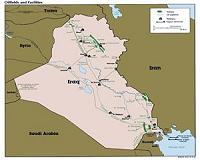 |
Saint-Hyacinthe, Canada (AFP) Oct 7, 2010 Natural gas was only discovered beneath the shores of Canada's scenic Saint Lawrence seaway two years ago, but already locals fear a "gold rush" by energy companies thirsting to drill. At a recent town hall meeting to unveil their natural gas development plans, industry representatives were heckled by an angry mob concerned mostly for the environment. "Your objective... is money," the crowd cried. "Companies are doing like people did during the gold rush in the 1850s in California. They arrive and say 'We're home,'" said Gerard Montpetit. He is one of the 600 residents of Saint Hyacinthe and surrounding communities, 50 kilometers (31 miles) east of Montreal, who attended the meeting meant to assuage fears. For weeks, the elderly pensioner has traveled across the province to participate in debates on whether to allow the industry to dig wells in Canada's "Beautiful Province" in search of a wealth of natural gas believed hidden beneath the ground. At the Saint Hyacinthe meeting, he was among the majority opposed to natural gas exploration in the province, railing against a campaign of "disinformation" directed at Quebecers. The latest poll showed only 20 percent of Quebecers support developing the resource. Some are calling for the industry to be nationalized, while others want it stopped. Several denounced the secrecy surrounding the issue. And all point to the environmental risks, citing an example in the US state of Pennsylvania, where locals accused the natural gas industry of polluting ground water. Barely two years ago, shale natural gas was discovered in the clay 2,000 meters (6,600 feet) beneath the shores of the Saint Lawrence seaway between Montreal and Quebec City. This summer, many in the valley began to notice strange reddish flames in the sky above, coupled with loud detonations: natural gas exploration had begun pinpointing possible viable well locations. Gas extraction would soon follow. More than 150 prospecting licenses have been issued, including in the city of Montreal itself. Some 20 exploration wells have so far been dug within 100 meters (328 feet) of a school, behind a farm, even in a corn field. According to the industry, the deposits will assure Quebec's energy independence for the next century, with six billion cubic meters of natural gas extracted annually. "Over 10 years, this will represent two billion dollars of investment annually and 7,500 jobs," Andre Caille, president of the Quebec Oil and Gas Association, told AFP. But instead of rejoicing in this prospective prosperity, most of the province's 7.9 million habitants appear worried about embarking on this path and where it will lead. Until now, Quebec has never produced any hydrocarbons. "We have a beautiful province, let's not mess it up," Marc Beaule told the town hall meeting. Concerned about the wellbeing of her daughter whose school is a stone's throw from a natural gas well, Marie-Eve Mathieu said: "Democracy is being denied." "I learned about the well only the day before yesterday. Nobody had bothered to point it out to us before," she said. Despite fierce opposition, exploration drilling is likely to continue for the time being. The Quebec government has ordered an investigation into possible environmental risks of natural gas extraction, but also expressed strong support for development of a local hydrocarbon industry. Producers are just waiting for regulatory permission to get it off the ground. Canbriam Energy chief executive Paul Myers said Quebec could see peak production in about 10 years. His company has already spent 40 million dollars to determine if the Quebec deposits hold sufficient quantities to be economically viable. In his view, "shale gas is a clean energy and an alternative to most of the others hydrocarbons."
Share This Article With Planet Earth
Related Links Powering The World in the 21st Century at Energy-Daily.com
 Iraq's new reserves buck 'peak oil' crisis
Iraq's new reserves buck 'peak oil' crisisBaghdad (UPI) Oct 6, 2010 Iraq's sharp upward revision of its oil reserves to 143.1 billion barrels, and the prospect that there's much more to come, has cemented the country's status as a long-term energy producer when researchers say global oil output is set to decline. The Oil Ministry's announcement Monday raised Iraq's known oil reserves by 24 percent, eclipsing Iran's declared reserves of 137.6 billion bar ... read more |
|
| The content herein, unless otherwise known to be public domain, are Copyright 1995-2010 - SpaceDaily. AFP and UPI Wire Stories are copyright Agence France-Presse and United Press International. ESA Portal Reports are copyright European Space Agency. All NASA sourced material is public domain. Additional copyrights may apply in whole or part to other bona fide parties. Advertising does not imply endorsement,agreement or approval of any opinions, statements or information provided by SpaceDaily on any Web page published or hosted by SpaceDaily. Privacy Statement |